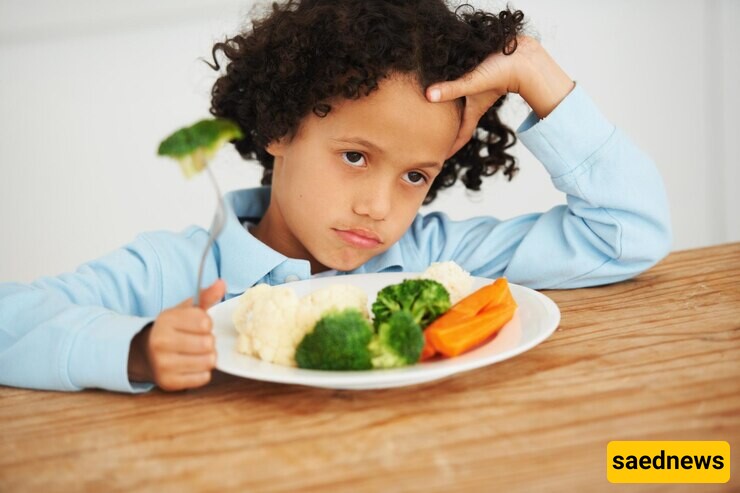SAEDNEWS: If loss of appetite is not addressed and treated, it can have serious impacts on a child's physical and mental growth. Inadequate intake of energy and essential nutrients for growth, such as vitamins and minerals, can lead to weight loss, underdevelopment of internal and external organs, and weakened immunity.

According to SAEDNEWS, a nutrition specialist states: If loss of appetite is not addressed and treated, it can have serious impacts on a child's physical and mental growth. Inadequate intake of energy and essential nutrients for growth, such as vitamins and minerals, can lead to weight loss, underdevelopment of internal and external organs, and weakened immunity.
Nowadays, one of the concerns for parents with young children is their loss of appetite and picky eating habits. Children who refuse to eat using any excuse or trick, or if they do feel hungry, prefer unhealthy foods. In family gatherings, mothers often chase their children with a plate of food, trying to get them to take a bite. What causes loss of appetite in children? What solutions can be used to address and treat this issue?

Loss of appetite in children and its impact on growth is one of the parents' concerns. Loss of appetite in a child should be distinguished from picky eating. In picky eating, the child has a good appetite but prefers only a limited number of foods for various reasons. In contrast, loss of appetite means the child refuses to eat or eats less than their nutritional needs.
If loss of appetite is not addressed and treated, it can have serious impacts on a child's physical and mental growth. Inadequate intake of energy and essential nutrients for growth, such as vitamins and minerals, can lead to weight loss, underdevelopment of internal and external organs, and weakened immunity. Recent studies have also shown a strong link between nutrient deficiencies and behavioral disorders in children.
Several factors contribute to a child's loss of appetite, including clinical factors like various infectious diseases, digestive disorders such as nausea and constipation, certain medications, stress, anxiety, and even lack of food variety. Once the cause of loss of appetite is identified, various solutions can be implemented, such as treating underlying illnesses, providing suitable food variety, eating in a cheerful environment with peers or loved ones, and engaging in physical activity before meals to stimulate the child's appetite.
In cases where a child's loss of appetite persists or their growth is hindered, appetite stimulants can be used as a complementary solution alongside proper nutrition to speed up the child's growth. Appetite stimulants typically contain vitamins, minerals, and herbal extracts that can increase the desire to eat. This helps children consume more food and receive more nutrients. Some appetite stimulants also contain compounds that improve digestive function. For example, the B vitamins and zinc in these stimulants can facilitate digestion and enhance nutrient absorption. The B vitamins can also increase the child's energy levels and reduce fatigue, aiding in daily activities, play, and learning. Additionally, increased intake of micronutrients strengthens the immune system, reducing the risk of infections and digestive-related illnesses.
While appetite stimulants have some benefits, they can never replace the adequate intake of nutritious food. For proper growth and health maintenance, children must have a healthy diet that includes all food groups daily. Alongside proper intake, appetite stimulants can increase the child's desire to consume more healthy and beneficial foods.

